At the Aspen Institute Economic Opportunities Program, and for our many colleagues and partners, the ongoing and intertwined health, economic, and racial justice crises bring new urgency to our work to improve access to quality jobs, options to participate in business ownership, and the freedom to pursue economic opportunity. Below we share our monthly newsletter with highlights of recent work. As always, we welcome your feedback, thoughts, and partnership in advancing inclusive opportunity and an economy in which we all can thrive. Click here to subscribe.
Click here to view past editions of our newsletter.
News and Updates
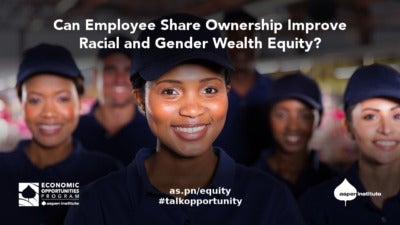
Can Employee Share Ownership Improve Racial and Gender Wealth Equity?
Structural inequity has created stark wealth divides along racial and gender lines, which have worsened since the start of the pandemic. For women and people of color, this limits opportunities like owning a home, starting a business, investing in education, and saving for retirement. How can employee share ownership help correct this inequity? This question was the focus of our last Opportunity in America event, “Can Employee Share Ownership Improve Racial and Gender Wealth Equity?” Our speakers and moderator brought great insights, experience, and creative energy to this vital discussion, including perspectives from research, business, policy, and worker-owners themselves. In addition, audience members shared a variety of informative resources, including research reports, infographics, directories, and more. We compiled a selection of these items and added them to our event page. Click here to watch, listen, and learn more.

Open sign at coffee cafe, Lifestyle of people at coffee shop.
Scaling Lending to Entrepreneurs of Color
Small businesses have been hammered by the pandemic, and business owners of color have been hit particularly hard. While people of color are often locked out of traditional lending, Community Development Financial Institutions (CDFIs) can offer a promising alternative to those who have been left behind. A recent event, “Scaling Lending to Entrepreneurs of Color,” the first in the Global Inclusive Recovery and Rebuilding series developed under the Global Inclusive Growth Partnership, explores the challenges that entrepreneurs of color face in accessing credit, and what can be done to address them. What are the unique needs of business owners of color, and how are they shaped by the racial wealth gap? Why are smaller loans essential in reaching entrepreneurs of color, and why is it so challenging for lenders to make smaller loans? What are some innovative ideas to help CDFIs to scale their microlending? Click here to watch.
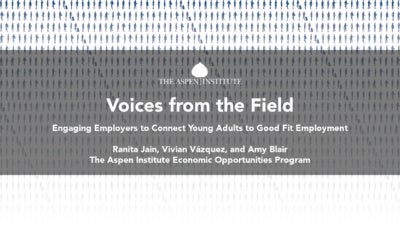
Voices from the Field: Engaging Employers to Connect Young Adults to Good Fit Employment
America’s youngest workers are facing the most severe employment prospects since the Great Depression, and workforce development and education providers are scrambling to meet their needs. Now more than ever, they need accurate information on available employment, including wages, health insurance, paid leave, scheduling, and safety. Our new report, “Voices from the Field: Engaging Employers to Connect Young Adults to Good Fit Employment,” compiles insights from workforce professionals about the types of questions they ask employers. 210 workforce professionals in Cleveland, Indianapolis, and Philadelphia responded to a survey about the kinds of conversations they have with business representatives on topics related to workplace practices, environment, and equity and inclusion in the workplace. Click here to read more.
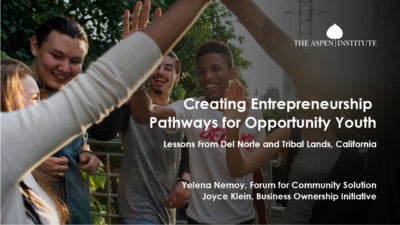
Creating Entrepreneurship Pathways for Opportunity Youth: Lessons From Del Norte and Tribal Lands, California
Among the urgent tasks we must undertake as we rebuild our economy is connecting young people to the economy that has left many of them behind. In 2017, the Aspen Institute Forum for Community Solutions launched the Youth Entrepreneurship Fund, which explores entrepreneurship as a pathway to economic self-determination and wealth-building for opportunity youth. The Forum partnered with the Business Ownership Initiative to co-lead a community of practice among the YEF grantees and document the learnings from this work. Our new case study, “Creating Entrepreneurship Pathways for Opportunity Youth: Lessons From Del Norte and Tribal Lands, California,” explores the local context and history of the opportunity youth efforts and how entrepreneurship fits into the larger body of community-building work in Del Norte. Click here to read more.
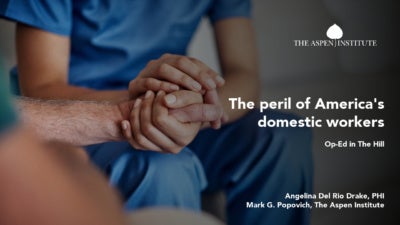
The peril of America’s domestic workers
The domestic workers who care for our loved ones and tend our homes suffer with extraordinarily high rates of unemployment in the pandemic. Many others are exposed to disease as they do their jobs. Recently The Hill published an op-ed by Angelina Del Rio Drake (PHI Chief Operating Officer and EOP Job Quality Fellow) and our own Mark Popovich (Director, Good Companies/Good Jobs Initiative). Their article brings the crushing burden on domestic workers into sharp relief. They describe policy changes and individual actions needed to fairly treat the 2.5 million people who do this hard and skilled work for us. Del Rio Drake and Popovich contributed a related piece to Working-Class Perspectives, the blog of the Kalmanovitz Initiative for Labor and the Working Poor at Georgetown University. Click here to read more.
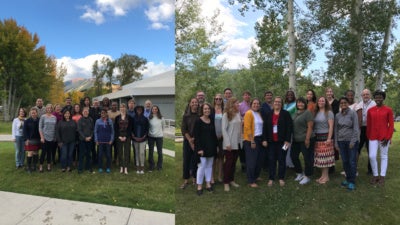
Reconvening the Job Quality Fellows
The Job Quality Fellows met over Zoom for the first of a two-part convening to take place this fall. Attendees included members of both cohorts, including the inaugural class of 2017-18 and the class of 2018-19. Fellows are working together to draft an economic recovery agenda centered on equity and job quality, which will be released later this year. The agenda draws on the Fellows’ Job Quality Statement of Purpose, which cites good wages, working conditions, hours, and benefits as key aspects of a quality job. This year, perhaps more than any other in recent memory, we see how crucial these elements are to working people and their families. Fellows will meet again on Thursday, November 5. Click here to learn more about the Job Quality Fellows.
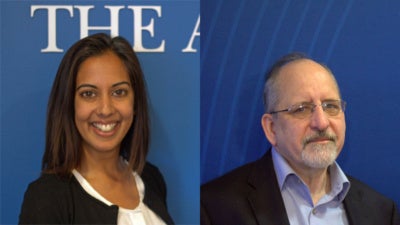
EOP Celebrates Manufacturing Month
October is Manufacturing Month! EOP staff participated in several virtual events about improving work in manufacturing. On October 21, Senior Evaluation Manager Ranita Jain joined Matt Bruce, executive director of the Chicagoland Workforce Funder Alliance, for a webinar on “Employee Investment to Increase Engagement and Retention.” This session explored how employee investment and job design practices in manufacturing can improve both frontline worker experiences and business performance. On October 22, Good Companies/Good Jobs Initiative Director Mark Popovich joined two Job Quality Fellows for a webinar on “Manufacturing Quality Jobs.” Popovich spoke alongside Job Quality Fellow Rick Plympton, CEO of Optimax. The discussion was hosted by the Ohio Workforce Coalition and facilitated by Job Quality Fellow Rebecca Kusner, Chief Strategist of R4 Workforce. As the event description notes, “While manufacturing has come a long way from its dirty, dark, dangerous history, there is still a great deal to be done to address the quality of manufacturing jobs… From wages to flexible scheduling and career paths to profit sharing, there are ways to do well and take care of workers.”
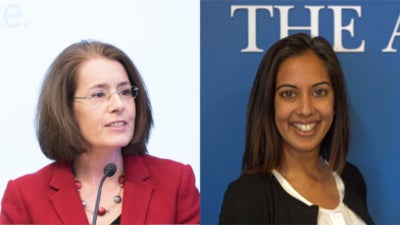
Research and Evaluation Conference on Self-Sufficiency
This month EOP staff participated in the Research and Evaluation Conference on Self-Sufficiency, hosted by the Administration for Children and Families, U.S. Department of Health and Human Services. On October 14, Senior Evaluation Manager Ranita Jain joined researchers from Abt Associates and Case Western Reserve University in a discussion on “Building the Evidence Base on Youth Employment Approaches.” On October 22, Jain and EOP Executive Director Maureen Conway joined researchers from Mathematica and the Urban Institute in a discussion on “Engaging Employers in Workforce Development: Obstacles and Lessons Learned.”

Meeting their Mission: How CDFIs Can Better Serve Communities of Color
The pandemic has underscored the role that Community Development Financial Institutions (CDFIs) play in supporting underserved communities, including providing access to capital for small businesses left out of traditional financial markets, many of which are owned by women and people of color. On October 7, BOI Director Joyce Klein participated in a webinar, “Meeting their Mission: How CDFIs Can Better Serve Communities of Color,” hosted by Northern California Grantmakers. Klein spoke alongside Olivia Rebanal (Capital Impact Partners), Nina Robinson (The Runway Project Oakland), and moderator Amy Wallace (JPMorgan Chase & Co.). Click here to watch.

Updates from UpSkill America
UpSkill America Director Jaime Fall was a featured speaker during the October Chief Learning Officer Symposium. Fall appeared alongside Ken Taylor (President, Training Industry, Inc.) and Rachael Bourque (Director, Pearson Accelerated Pathways). The panel addressed the current state of business and the new world of work, including education and training strategies of employers to develop the skills of workers during a time of social distancing and remote work. Fall also moderated and contributed to a session for the U.S. Department of Labor’s Employment and Training Administration focused on employer engagement for apprenticeship programs. Attendees of the session were grantees of the U.S. Department of Labor’s Scaling Apprenticeship and Closing the Skills Gap programs. Other speakers included representatives from Alabama and Ohio who are engaged in robust sector strategy initiatives that include manufacturing apprenticeship programs.

National Council for Workforce Education Annual Conference
On October 8, Senior Evaluation Manager Ranita Jain facilitated a session at the National Council for Workforce Education Annual Conference. The session focused on how conversations about management practices, workplace culture, and employee experiences can be mutually beneficial for workforce professionals and employers.

First Work Youth Workforce Development Conference
On October 29, Senior Project Manager Jenny Weissbourd presented to Canadian workforce organizations at the First Work Youth Workforce Development Conference, Futures 2020. During the session on “Inclusive Economic Development: Sector and System Change – Re-imagining Retail,” Jenny shared lessons learned from EOP’s Reimagine Retail initiative, including sharing strategies to strengthen relationships with retailers and improve job quality for retail workers. Click here to learn more.
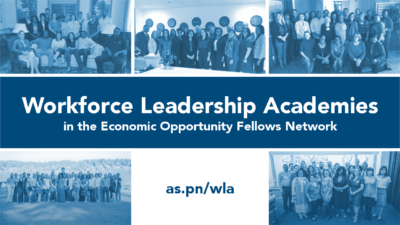
Updates from the Workforce Leadership Academies
Fellows in the Dallas Economic Opportunity Leadership Academy—offered in partnership with Corporation for a Skilled Workforce—shared their recommendations for systems changes to a virtual group of local stakeholders. CoLabs focused on a range of topics, including creating pathways for opportunity youth to connect with healthcare employment opportunities and continuing to build the capacity of the workforce system to address racial inequity. Marking the conclusion of the Academy, Fellows contributed to a video describing the impact of their experience, highlighting the significance of developing key leadership capabilities and strengthened networks for effectively serving their clients, and supporting the region’s pandemic-related economic recovery and doing so with equity at the center. Meanwhile, Fellows in Detroit are in the homestretch of refining their CoLab projects and are preparing for their stakeholder meeting next month!

Unfinished Live – Economy & Justice
Is capitalism working for all? Can we reimagine a better economy? The Aspen Institute has partnered with Unfinished, a new impact network devoted to advancing powerful solutions to the most critical challenges of our time. This fall they are presenting Unfinished Live, a series of interactive shows with impact that bring together a diversity of voices through interviews, art, videos, stories, and performances. The first episode of this series, “Economy & Justice,” premiered on October 27, featuring insights from CEOs, workers, activists, artists, small business owners, and social innovators. Click here to watch.
Upcoming Events
EOP will continue to host virtual events and webinars this season. Join our mailing list and follow us on social media to learn when new opportunities are available.
Join the conversation
Follow EOP on social media to join the conversation!
-Workforce Strategies Initiative @AspenWorkforce
-Business Ownership Initiative @Aspen_BOI
-UpSkill America @upskillamerica
About EOP
The Aspen Institute Economic Opportunities Program (EOP) advances strategies, policies, and ideas to help low- and moderate-income people thrive in a changing economy. We recognize that race, gender, and place intersect with and intensify the challenge of economic inequality and we address these dynamics by advancing an inclusive vision of economic justice. For over 25 years, EOP has focused on expanding individuals’ opportunities to connect to quality work, start businesses, and build economic stability that provides the freedom to pursue opportunity. For more information, visit as.pn/eop.
EOP has several initiatives, including the Business Ownership Initiative, Workforce Strategies Initiative, UpSkill America, and Good Companies/Good Jobs. In addition, across these approaches EOP hosts the Economic Opportunity Fellows Network and the Opportunity in America event series.
Thank you to our many partners and funders for supporting our efforts.
Support Our Work
We are committed to making our events and publications freely available to everyone who finds them useful. But if you find value in our work and are able to support it, please consider making a tax-deductible donation. Click here to learn more.
Keep in Touch
Click here to join our mailing list or sign up below. For updates every day, follow us on social media.
